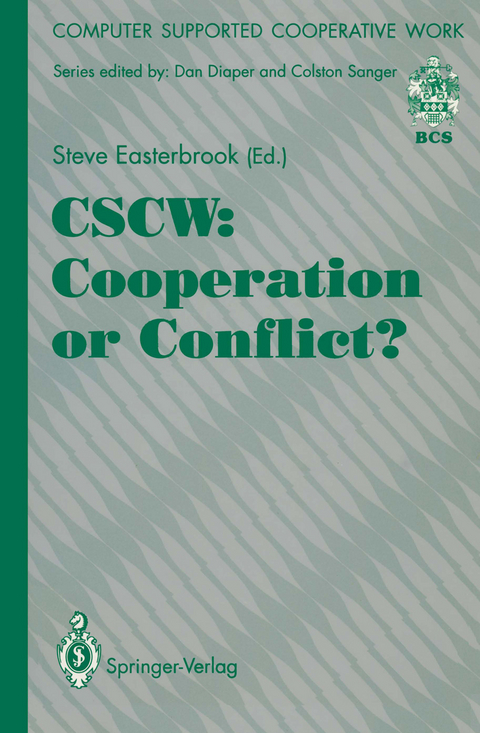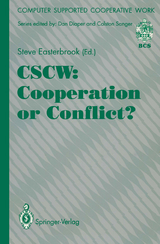CSCW: Cooperation or Conflict?
Springer Berlin (Verlag)
978-3-540-19755-3 (ISBN)
1 A Survey of Empirical Studies of Conflict.- 1.1 Introduction.- 1.2 Assertions about Conflict.- 1.3 CSCW Systems.- 1.4 Conclusions.- 2 The Social Dynamics of Systems Development: Conflict, Change and Organizational Politics.- 2.1 Social Factors in Design: Factor Research.- 2.2 The Dynamics of Design: Process Research.- 2.3 Process Studies of User Involvement.- 2.4 Design as Social Action: The Issue of Success.- 2.5 Models of Change: Punctuated Equilibrium.- 2.6 A Dialectical View of the Design Process.- 2.7 The Two Sides of User Involvement.- 2.8 The Psychoanalytic Perspective.- 2.9 Interpretation of the Case Studies: The Psychodynamics of Design.- 2.10 Conclusions.- 3 Cooperation Without Consensus in Scientific Problem Solving: Dynamics of Closure in Open Systems.- 3.1 Introduction.- 3.2 Science, Work and Problem Solving.- 3.3 Work is Collective: The Sui Generis Nature of Organizations.- 3.4 Scientific Theories are Open Systems.- 3.5 Plasticity and Coherence: The Paradox of Open Systems.- 3.6 The Dynamics of Coherence in Open Systems: The Clotting of Ideas and Practice.- 3.7 The Heterogeneity of Scientific Work.- 3.8 Heterogeneous Problem Solving and Boundary Objects.- 3.9 Types of Boundary Objects.- 3.10 Conclusions.- 4 Resolution of Inter-Individual Conflicts: A Mechanism of Learning in Joint Planning.- 4.1. Introduction.- 4.2 Sociocognitive Conflict.- 4.3 Focus in Discourse.- 4.4 Components of the Model.- 4.5 Inter-Individual Differences.- 4.6 First Study.- 4.7 Second Study.- 4.8 General Discussion.- 5 Cooperation and Conflict in Knowledge-Intensive Computer Supported Cooperative Work.- 5.1 Introduction.- 5.2 Cooperation and Conflict in Practice.- 5.3 The "Organization" of Organizations.- 5.4 Experts as People.- 5.5 Conclusion.- 6 Organizational Structures,Computer Supported Cooperative Work and Conflict.- 6.1 Introduction.- 6.2 Conflict in Cooperative Work.- 6.3 Stratified Systems Theory and "Levels" of Work.- 6.4 Cooperation and Conflict in Organizations: The Construction Industry.- 6.5 Organizational Issues and Conflict in Design Construction.- 6.6 Implications for the Design of Technology for Cooperative Working.- 6.7 Conclusion: Models of Organizations, the Nature of Work and Enhanceable Systems.- Going Off the Rails: Understanding Conflict in Practice.- 7.1 Introduction.- 7.2 Perspective on Cooperation and Conflict.- 7.3 Conflict in Practice.- 7.4 Going off the Rails: Requirements and Questions.- 7.5 Summary and Future Work.- 8 The Computer Won't Let Me: Cooperation, Conflict and the Ownership of Information.- 8.1 Theme.- 8.2 Background.- 8.3 Taxonomy.- 8.4 Ownership of Information.- 8.5 Consequences for CSCW Design.- 8.6 The MILAN System.- 8.7 Task Conflict in the Whiteboard.- 8.8 Ownership Conflict in the Video Views.- 8.9 Conclusions.- References.- Name Index.
| Erscheint lt. Verlag | 26.2.1993 |
|---|---|
| Reihe/Serie | Computer Supported Cooperative Work |
| Zusatzinfo | XVI, 211 p. 7 illus. |
| Verlagsort | London |
| Sprache | englisch |
| Maße | 155 x 235 mm |
| Gewicht | 360 g |
| Themenwelt | Mathematik / Informatik ► Informatik ► Datenbanken |
| Informatik ► Theorie / Studium ► Künstliche Intelligenz / Robotik | |
| Mathematik / Informatik ► Informatik ► Web / Internet | |
| Schlagworte | colaboration • Computer-Supported Collaborative Work • Computer Supported Co-operative Work • conflict • CSCW (Computer Supported Cooperative Work) • decision support • Human Computer Interaction • information system • learning • Problem Solving |
| ISBN-10 | 3-540-19755-9 / 3540197559 |
| ISBN-13 | 978-3-540-19755-3 / 9783540197553 |
| Zustand | Neuware |
| Haben Sie eine Frage zum Produkt? |
aus dem Bereich




